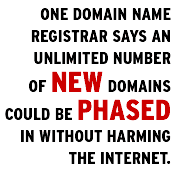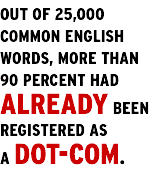| |||||||||

Trademark owners may get millions of new names
 The Internet's policy organization is considering a proposal that would give trademark holders "first dibs" on millions of planned new domain names. The Internet's policy organization is considering a proposal that would give trademark holders "first dibs" on millions of planned new domain names. The Internet Corporation for Assigned Names and Numbers, a nonprofit organization responsible for maintaining infrastructure for Internet addresses, faces great pressure to create new commercial domains in addition to ".com." A 1999 study showed that, out of 25,000 common English words, more than 90 percent had already been registered as a dot-com. Fresh domains, such as .company and .web, could accommodate more newcomers. For the sake of discussion, I dub these new domains the "not-coms." It's unclear how many not-coms ICANN will allow. One ICANN committee issued a report on March 21 calling for only six to 10 new domains initially. Meanwhile, another committee, this one examining trademark issues, released a consensus report on April 17. It stated, "There does not appear to be the need" to protect a special list of trademarks. Existing laws protect trademark holders against "bad faith" uses, such as an imitator pretending to be an official Web site. In a surprise move, trademark holders have now trumped the committee's apparent consensus. They're seeking protection directly from ICANN's board.
A new proposal would give holders of registered trademarks the sole right to register names in any new domain during a "Sunrise Period... before that new domain is opened to the general public." In addition, trademark holders could claim up to 20 additional names in the new domain. "Sunrise+20" proponents generated scores of favorable messages to ICANN. Most came from trademark attorneys whose clients include Dow Jones, Kodak, Proctor & Gamble, Nestle, 3M and other large corporations. Arthur Sacker, vice president of Time Warner (holder of CNN, HBO, Sports Illustrated, Superman, and numerous other marks), said ICANN "should allow for the registration of twenty variations of these registered trademarks." But the proposal immediately drew the fury of trademark law specialists. Ellen Rony, co-author of The Domain Name Handbook, points out that more than a million trademarks are registered in the United States alone. She says Sunrise+20 "represents a potential set-aside of 20 million domain names" before anyone else gets a single one. By comparison, there are only 17.5 million names ending in .com, .net, and .org in the entire world, according to a tally by whois.net. Michael Froomkin, a former member of the Panel of Experts of the World Intellectual Property Organization, expressed astonishment at the reach of Sunrise+20. He said trademark law grants only a right "to use a trademark in a limited scope," not to prohibit any other use of a word at all. Attorney John Berryhill noted that "there are dozens of marks that include the word delta," including Delta Airlines, Delta Faucets and sororities that use Delta in their names. These different uses cause no consumer confusion. Your faucet may say "Delta," but you don't ask your sink, "When's the next flight?" Richard Sexton, president of Internet service provider VRx Network Services, has co-written with Berryhill a counter-proposal, signed by several other experts. Their statement notes that the Internet has the technical ability to support a nearly infinite supply of domains. ICANN could permit any string of up to 63 characters after the "dot." This would eliminate the artificial shortage that has inflated the resale price of some dot-com names into millions of dollars. Ross Rader, director of Tucows Names, the world's third-largest domain-name registrar, confirms that an unlimited number of new domains could be phased in without harming the Internet. Companies could then register delta.airlines, delta.faucets, delta-sigma.theta, and so forth. Billions of new combinations would open up. "Now you've eliminated all scarcity in the market," Rader says. "You've eliminated paying $10 million for business.com." Action may come soon. ICANN spokeswoman Pam Brewster says, "The board will probably authorize some kind of request for proposals" from vendors at its next meeting, July 14-17 in Yokohama, Japan. Until then, Internet users can express their opinions by sending email to comments@icann.org. Do you know of a problem affecting consumers? Send info to tips@BrianLivingston.com. He'll send you a book of high-tech secrets free if you're the first to submit a tip he prints.
biography |
|
|||||||||||||||||||||||
|
Send us news tips | Contact Us | Corrections | Privacy Policy |
|

